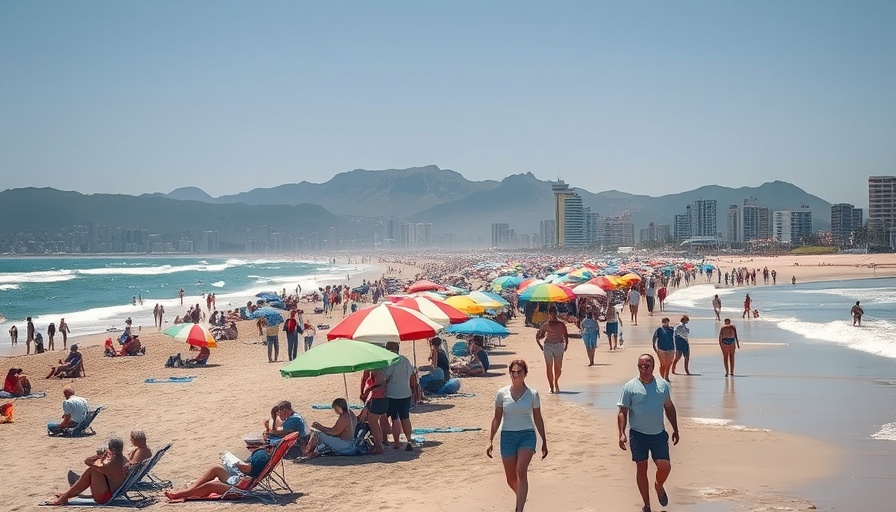
A Melody of Change: Rio's Samba Scene Faces New Regulations
In a city where samba music and vibrant beach life symbolize culture and tradition, Rio de Janeiro's recent move to regulate live music on its world-famous beaches has sparked concern among locals and visitors alike. The samba echoing from kiosks and beach vendors has become synonymous with the carioca experience, but as municipal authorities tighten their grip on noise and street activities, questions arise about the future of this beloved tradition.
Understanding the New Regulations
The mayor of Rio has proposed limits on live music performances, particularly targeting the spontaneous rhythm of samba that has long entrained beachgoers. The regulations aim to address complaints from residents regarding noise pollution and crowding that can sometimes disrupt the serenity of popular beaches like Ipanema and Copacabana. While the intention is to strike a balance between local living conditions and tourism, many fear this could rob the beaches of their unique vibrancy.
Why Samba Music Matters: The Social Connection
Samba is not just music; it is a cultural lifeline for the people of Rio. Its roots are embedded deeply within the nation's heart, with origins tracing back to African rhythms brought over by enslaved people. Extending beyond mere entertainment, samba acts as a communal glue that binds friends and families together during sunny beach days. If these new restrictions take hold, the communal experience that defines Rio’s beaches may diminish.
The Cultural Significance of Samba
The bustling beach scene of Rio is a celebration of life, a vibrant tapestry woven with laughter, dance, and music. Samba serves as the soundtrack to this celebration, promoting social connection, often leading to impromptu dance-offs and heartfelt sing-alongs. The proposed limitations threaten to marginalize not only the musicians who rely on public performance but also the very culture that draws millions to these shores annually.
Possible Consequences of Limiting Beach Music
As discussions about these regulations continue, it's crucial to consider potential consequences. Beyond battling complaints about noise levels, there lies a profound risk of cultural dilution. Limiting samba music could discourage street performers, impacting local economies reliant on tourism. If the lively atmosphere diminishes, so too could foot traffic, ultimately hurting not just musicians, but vendors who sell drinks, food, and souvenirs.
A Common Misconception: Quietness Equals Peace
One prevailing myth is that quieter beaches promote tranquility. However, the reality is nuanced; the loud play of samba amidst the sound of waves often creates an ambiance that is uniquely peaceful and joyful. Historically, Rio's identity has thrived on the vibrant chaos of beach culture, and many visitors travel far and wide to immerse themselves in this uncommon cultural experience.
Balancing Act: Finding a Solution
To address the issue of noise while retaining cultural significance, city officials might explore alternatives that incorporate both regulation and freedom for cultural expressions. Designated areas for performance could provide a solution, allowing musicians to continue sharing their art without infringing on the peace valued by residents. This collaborative approach could preserve that spark of samba that invigorates Rio's coastline.
Future Insights: A Transformative Era for Rio's Beaches
Looking forward, the conversation surrounding regulations sparks broader discussions about preserving cultural phenomenons in an urban landscape shifting towards modernity. How can cities like Rio maintain their unique cultures amidst growing urban development? Future policies must consider the social implications of any restrictions imposed, weighing economic benefits against intrinsic cultural value.
Join the Conversation
As Rio de Janeiro prepares for this cultural crossroads, it’s crucial for everyone to be a part of the dialogue. How do you think the city should balance these interests? Should samba music continue to resonate along the beaches, or is a quieter landscape preferable? Voice your thoughts and engage with your community to determine the future of samba in Rio.
As we watch this situation evolve, it's a vivid reminder of the ever-present tension between modernization and cultural heritage—an issue that resonates far beyond the borders of Brazil as cities across the globe grapple with similar dynamics.
 Add Row
Add Row  Add
Add 




 Add Row
Add Row  Add
Add 

Write A Comment